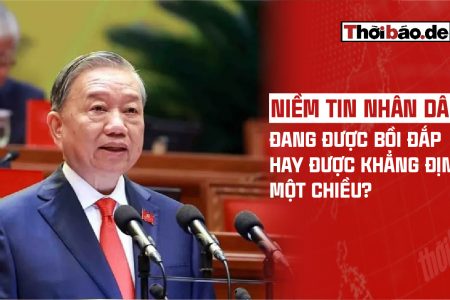
US oil and gas corporation ExxonMobil is said to be considering withdrawing from the billion-dollar Blue Whale project with Vietnam in the South China Sea (Vietnam calls it the East Sea). If it goes as planned, the decision of the board of directors has been finalized at the end of October, now just waiting to be announced.
The Blue Whale project in which ExxonMobil holds 64% of the shares has completed the overall design and is about to move into the development phase of the mine, but is „stuck“ after 3 years of unsuccessful contract negotiations with the Vietnamese government.
Vietnam, once again, faces huge losses not only in the economic field.
What is the cause of this and what lessons can be learned here?
Is there pressure from China?
The fact that Exxon Mobil wants to withdraw from the Blue Whale oil project has in fact been mentioned for a long time. However, the present moment is considered decisive, when failed negotiations last for many years, causing capital accumulation, reducing investment efficiency, plus financial difficulties due to the Covid epidemic, making it more difficult to wait for ExxonMobil to withdraw from the project.
Oil and gas industry expert, Mr. Nguyen Le Minh, told BBC News Vietnamese that the reason for the withdrawal, he said, was purely economic.
„Geographically, the Blue Whale mine is only 90km from the shore, located entirely on the continental shelf of Vietnam, so there is no political pressure.
In addition, ExxonMobile can completely choose to ‚fight a fake battle‘, wait for the successful project transfer, ‚get a price‘, and then officially announce its withdrawal from the project.
However, they did not do so, proving that they are no longer interested in the project, and are not under any pressure other than their internal needs. There is a trend of shifting investment in clean energy, green, renewable energy in accordance with international commitments on environmental protection.“
Sharing the same view, international law lecturer, Mr. Hoang Viet, shared his opinion with the BBC:
„Firstly, in the past time, the world oil price has dropped at times, making Exxon Mobil’s business activities unfavorable. Therefore, they need to cut some less profitable projects to focus on projects which have higher profits.
Secondly, the contract negotiation at Ca Voi Xanh mine took a long time, not on schedule, so it was difficult to arrange capital and reduce investment efficiency. Not to mention, the downstream side has not finalized gas and electricity prices, and it is not known for sure when the new project will be deployed. Therefore, Exxon Mobil believes that the profitability of the project is not as expected and that leads them to want to withdraw.“
Bill Hayton, the author of „South China Sea: A Power Struggle in Asia“ (2014), also leans towards commercial reasons when ExxonMobil just announced its intention to withdraw in September 2019.
Rosneft VN cancels contract with Noble in the East Sea: ‚Pressure from China, but different nature of Repsol case‚
„Exxon is under pressure to increase the share price so they have to sell assets to buy back shares… Exxon has been bargaining with the Vietnamese government for the gas price of the Blue Whale project for many years without reaching an agreement… Rumors of CO2 contamination of the mine mean that the development of the field could be much more costly than initially thought so this seems to me to be down to commercial pressure rather than pressure. the political force from Beijing,“ Bill Hayton wrote on Twitter.
As the world’s leading oil and gas group, ExxonMobil „felt very uncomfortable“ when the Vietnamese government should have made efforts to cooperate and comply with the agreements as originally signed by the two sides, but did not do, according to Mr. Hoang Viet.
In addition to numerous overlapping laws and regulations, the Vietnamese side is also entangled with political factors, as predecessors in the oil and gas industry, such as Mr. Dinh La Thang, Trinh Xuan Thanh, have been prosecuted and imprisoned.
„Therefore, the officials in charge of the Blue Whale project are very hesitant to make decisions, because they may be held responsible later. These lead to ExxonMobil wanting to withdraw,“ said Mr. Hoang Viet.
However, observers do not rule out the possibility of pressure from China.
Professor Carl Thayer from Australia revealed to the BBC in an interview in September 2019 that a Vietnamese official told him that after China sent ships to Vanguard Bank and the oil and gas joint venture Rosneft withdrew from an exploratory drilling project also at Vanguard Bank due to pressure from China, will, in turn, be noticed by the Blue Whale project by China.
Who will take over the Blue Whale mine?
ExxonMobil will transfer all 64% of the project’s shares (upstream) to the host (PetroVietnam or another potential partner, according to Mr. Nguyen Le Minh to the BBC.
To be transferred the right to operate the Voi Xanh gas field, Vietnam needs to negotiate with ExxonMobil and need to spend at least more than $300 million in compensation.
In the event of a failure of negotiations, ExxonMobil has the legal right to transfer the Blue Whale project to a third party.
This third party, not excluded, can fall into the Chinese oil and gas group because they have potential and have also expressed interest in the Blue Whale field, according to Mr. Nguyen Le Minh.
Overlapping of laws and governance
The Blue Whale project has a total investment of about $10 billion, which was very promising at first, but now has a high risk of failure, because it involves many parties, complicated laws, takes a lot of time, and lost investment opportunities and economic performance, observers said.
According to an expert observing the East Sea, the „rule of law“ here includes the Petroleum Law (for the upstream stage, including exploitation rigs, drilling wells, and underground pipelines), the Construction Law (for the upstream stage). midstream, including gas pipelines; and downstream, including gas treatment plants and power plants,), and the Law on Public Investment (regarding state capital).
Besides, the Ca Voi Xanh field has high C02 content, so it is necessary to apply advanced extraction technology, leading to high investment costs, making the gas price uncompetitive.
This led to a long stalemate in gas-electricity price negotiations, causing a loss of investment opportunities.
In addition, after the Covid pandemic and the global economic recession, both ExxonMobil and Petrovietnam were facing financial difficulties and both wanted to restructure their investments according to their own priorities.
„For ExxonMobil, it is shifting to clean energy investment. PetroVietnam is focusing its cash flow on Block B, located in the Malay-Tho Chu basin in the southwest of Vietnam, according to the hierarchy of priorities and progress, rather than entering the Blue Whale mine,“ according to Mr. Nguyen Le Minh.
What will Vietnam lose?
Experts also told the BBC that the Blue Whale project, if implemented, would boost the growth of the central provinces of Vietnam, change the face and balance socio-economic structures among regions.
The project will also contribute about $20 billion to the state budget, be the driving force for economic growth and create about 3000 to 4000 high-quality jobs for the central provinces; social income from taxes and investment returns in industrial zones, attracting foreign direct investment (FDI), experts interviewed said.
In addition, Blue Whale is also expected to become „a landmark“ for Vietnam to promote key projects in the offshore central region in the future, including the Ken Bau field.
Without continuing the Blue Whale project, of course, these opportunities will no longer exist. Because this is not only an economic issue, it is also a political and strategic issue, according to observers.
According to Mr. Hoang Viet, in the context that China is using strength and threat to achieve the goal of monopolizing the East Sea, the operation at the Blue Whale field is considered a way for Vietnam to regain its balance, because China It is not easy to threaten a large US corporation like ExxonMobil.
Under pressure from China, in 2017, Vietnam had to ask the Spanish company Repsol to cancel its exploration at Block 136.3 in the East Sea.
In 2018, Vietnam continued to request Repsol to cancel the ongoing project at Lot 07.3.
In 2020, Vietnam cancels new exploration and exploitation at Block 06.1.
„After three times Vietnam withdrew oil and gas projects in the East Sea, this time, if ExxonMobil withdraws, oil and gas groups in the world will be afraid to invest in Vietnam. to the development of the oil and gas industry as well as the prestige of the Vietnamese government, creating momentum for China to continue to dominate Vietnam in the East Sea,“ said Mr. Hoang Viet.
Lessons to be learned
According to Mr. Le Minh, in terms of state management, the Vietnamese government needs to make changes and corrections to current laws and strategic priorities.
The process of approving oil and gas projects and some other detailed provisions need to be legislated to be in line with international practices, in order to attract investment and be easier to apply.
The Vietnamese government also needs to reinvent its investment attraction policy, with commitments to a sustainable, safe, and promising investment environment, including consistency in policies, laws, and taxes.
In terms of strategy, the Vietnamese government needs to maintain a multilateral approach to oil and gas cooperation in the East Sea, with the emphasis being on the two superpowers Russia and the United States.
Mr. Hoang Viet also said that Vietnam’s governance ability before projects like Blue Whale has not proved effective. Complicated and overlapping laws and processes make it easy for foreign investors to get frustrated. Those are all problems that the Vietnamese government needs to overcome if it wants to attract foreign investment to develop the oil and gas industry.
Thoibao.de (Translated)


























